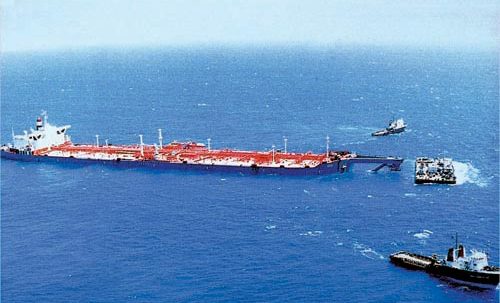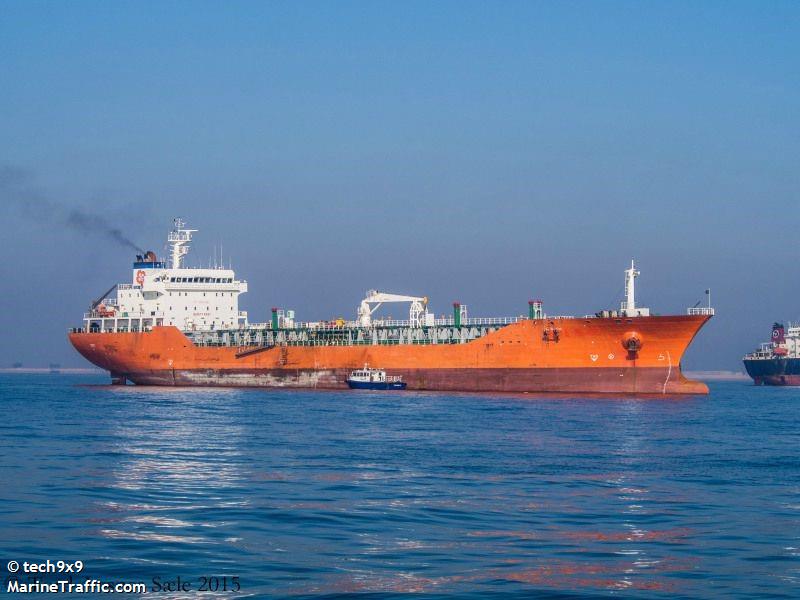Urgent political solution sought to take oil off abandoned FSO in the Red Sea

Without a swift resolution, an explosion or leak from the rusting FSO Safer off the coast of Yemen could trigger one of the biggest oil spill disasters in history. According to a new study produced by the Greenpeace Research Laboratories, the impacts could be much wider, more severe and longer lasting than thought from previously available information. If all the oil is spilled it would be four times bigger than the Exxon Valdez, causing widespread severe environmental damage and exacerbating the humanitarian crisis unfolding in Yemen and affecting neighbouring countries.
The FSO Safer has over 1.1m barrels of Marib light crude oil on board anchored in the Red Sea just 6 km off the coast of Yemen, where one of the world’s worst humanitarian disasters is unfolding. The vessel is at risk of exploding or spilling its oil cargo. Negotiations have so far failed to resolve how to secure the cargo and ship, which has been left without maintenance for the past seven years. Vital fire fighting and prevention equipment and the ship’s generators are not working.
If all the oil is spilled it would be four times bigger than the Exxon Valdez
Ahmed El Droubi, campaigns manager at Greenpeace MENA, said: “The abandoned tanker, with its toxic cargo of crude oil, poses a grave threat to the communities and environment of the Red Sea. The Safer can only be made safe by removing the oil from the ship into another vessel or vessels. Despite the difficulties, financial and political, we urge the United Nations and all the parties and governments in the region and elsewhere to prioritise this effort. Action to prevent a major disaster, or at least mitigate its impact, can no longer wait.”
Greenpeace has said an oil containment boom should be deployed around the Safer as a first step to hold back the spread of oil if there is a leak. But a boom is not a solution to prevent the short and long-term potential humanitarian and environmental impacts in the region, which only the removal of the oil from onboard the Safer could mitigate.
Paul Horsman, project lead Safer response team at Greenpeace International, said: “We accept that there are big challenges in removing the oil securely from the Safer, but the barriers to undertaking this are not technical but political. The technology and expertise to transfer the oil to other tankers exist, but despite months of negotiations we are still at a stalemate and the Safer remains in its ever-deteriorating state. Governments and the oil industry have a moral obligation to take ambitious action and stop putting people and pristine ecosystems like the Red Sea at risk for the sake of continued dependence on climate-wrecking fossil fuels.”
Countries such as Norway, the Netherlands, the UK, France, Germany and those in the region such as Bahrain have ready stockpiles of oil spill response hardware, and could send equipment to the region to be on stand-by, under United Nations (UN) coordination.
Senior representatives of the governments of Oman, Saudi Arabia, the United Arab Emirates, the United Kingdom, and the United States of America, met on Wednesday to discuss the situation in Yemen. The UN special envoy, Hans Grundberg, was a guest to the meeting. The representatives discussed the need to find an urgent solution to the FSO Safer and called upon the Houthis to allow UN access to the vessel to conduct an assessment of the tanker.

 off the coast of Yemen could trigger one of the biggest oil spill disasters in history. According to a new study produced by the Greenpeace Research Laboratories, the impacts could be much wider, more severe and longer lasting than thought from previously available information. If all the oil is spilled it would be four times bigger than the Exxon Valdez, causing widespread severe environmental damage and exacerbating the humanitarian crisis unfolding in Yemen and affecting neighbouring countries.
off the coast of Yemen could trigger one of the biggest oil spill disasters in history. According to a new study produced by the Greenpeace Research Laboratories, the impacts could be much wider, more severe and longer lasting than thought from previously available information. If all the oil is spilled it would be four times bigger than the Exxon Valdez, causing widespread severe environmental damage and exacerbating the humanitarian crisis unfolding in Yemen and affecting neighbouring countries.